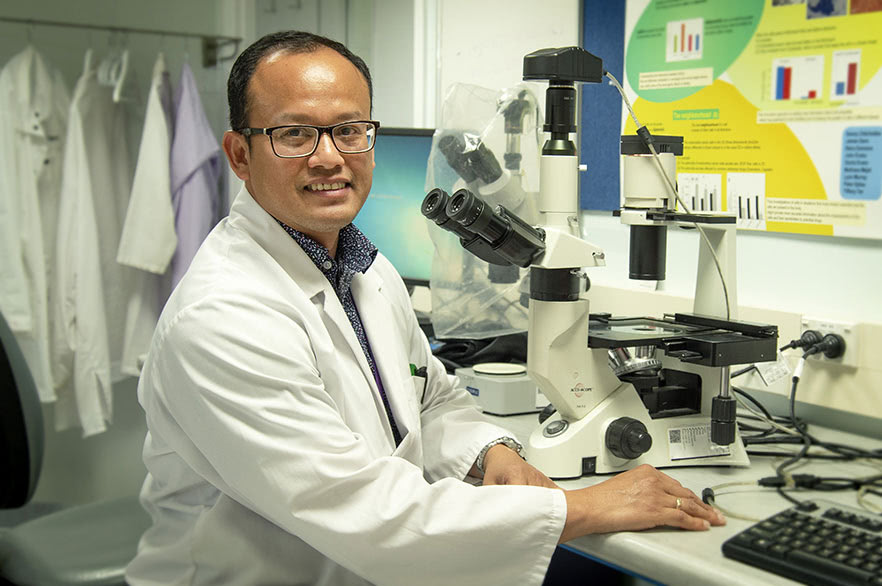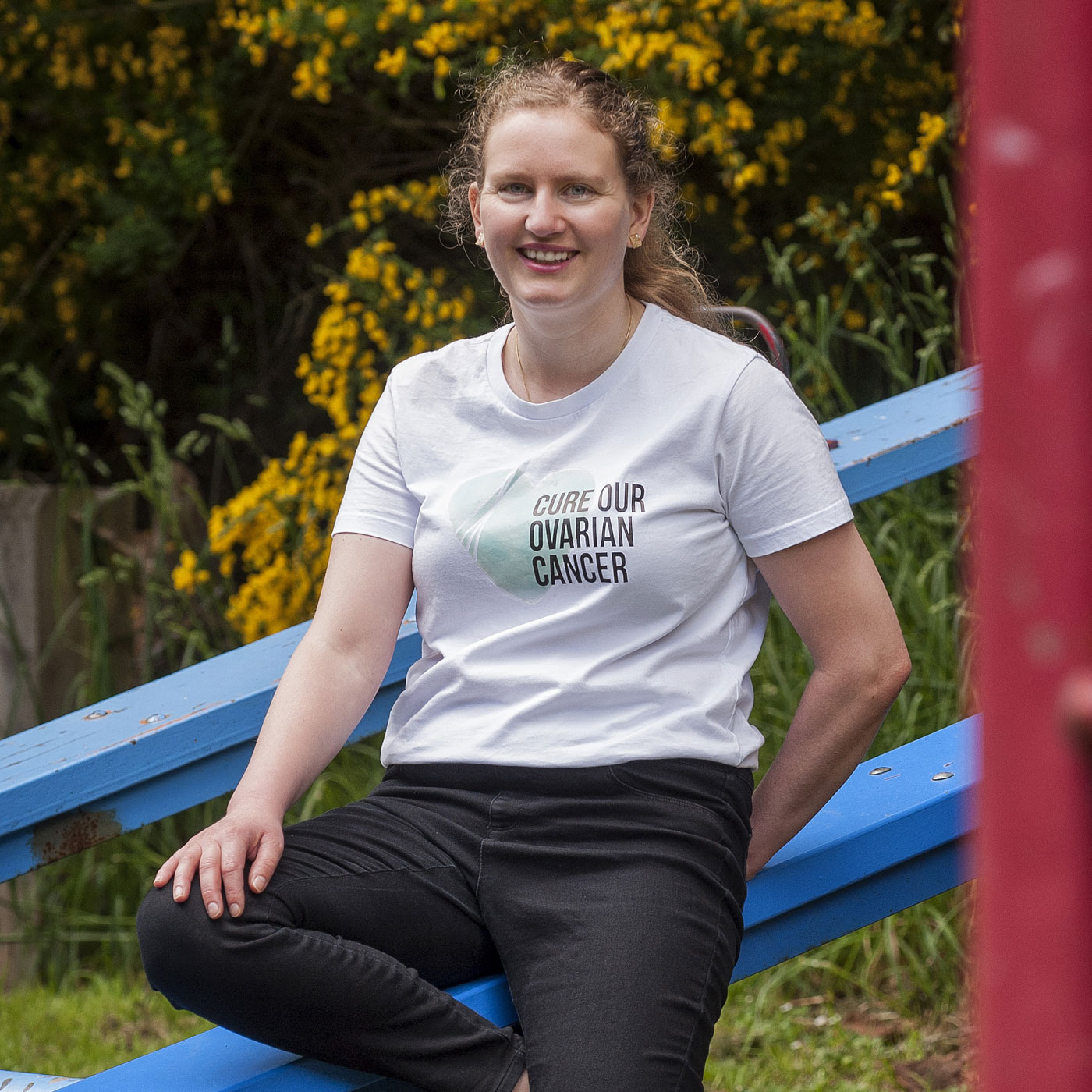Stepping
up
speaking
out
Alumna Jane Ludemann founded the Cure Our Ovarian Cancer Charitable Trust after being diagnosed with a rare form of the disease in 2017. Funds raised are now supporting research into potential new treatments at the University of Otago, Christchurch.
“I'm in my early 30s. Most of my friends are having kids, paying their mortgages and thinking about how to progress their careers. I'm worried about dying.”
Jane Ludemann is a 34-year-old wife and University of Otago optometry graduate who loves the outdoors and bakes “a good cake”.
She is also the founder of the Cure Our Ovarian Cancer (low-grade serous) Charitable Trust, established after she was diagnosed with the disease in 2017 and given a life expectancy of between five and 15 years.
Jane was diagnosed with stage 2 low-grade serous carcinoma, one of at least six distinct cancers that fall under the ovarian cancer umbrella. It typically affects younger women and is usually resistant to chemotherapy. The charity Jane founded focuses on raising awareness and money for research into this particular type of the disease.
Jane's diagnosis came after several years of niggling health problems. The doctors she consulted dismissed the idea of cancer because of her young age. However, emergency gynaecological surgery both identified cancerous growths and ruptured them, spreading cells throughout her abdomen.
“A lack of attention and funding in the past means that this type of cancer is deadly for most women. That's what Cure Our Ovarian Cancer is working hard to change.”
Following her diagnosis, Jane researched the rare form of ovarian cancer. What she learnt was “shocking and disturbing”. There was little research and the “latest” treatment advance involved breast cancer drugs more than two decades old.
"The survival of many cancers has improved massively. A lot of that is related to research. But while rare cancers account for nearly half of all cancer deaths internationally, they receive just 13.5 per cent of research funding. Low-grade serous carcinoma is one of these rare cancers and has been left behind.”
In June 2018 Jane decided to do something about that. She founded the Cure Our Ovarian Cancer (low-grade serous) Charitable Trust.
“Not many people talk about ovarian cancer, but it is the fifth most common cancer that kills New Zealand women. The brutal reality is that most of us die and are quite unwell before this happens. It makes it very difficult to mobilise and advocate for change,” she says.
“I loved my job and my life and I would never have started a charity unless it was really necessary. But no one was standing up for low-grade serous carcinoma and pushing for better outcomes and I realised if I didn't, no one would.”
In little more than a year and a half, Cure Our Ovarian Cancer has raised more than $150,000 for research, including $75,000 awarded to a University of Otago, Christchurch researcher Dr Kenny Chitcholtan [see below].
“All that money means research to find better treatments, so that's fantastic. Because the reality is that if we don't do a lot more research the survival rate for this cancer won't improve. And in 20 years' time young women will continue to get this cancer and die and that doesn't seem fair.”
The charity work involves sharing her story at public speaking events or in the media. This aspect has been difficult.
“It was really hard to go public because I like my privacy and this cancer takes so much from you. Medical examinations are invasive, and it is really challenging and scary living with this disease and coming to terms with your mortality. I don't enjoy being in the spotlight, but if I want others to speak up I need to lead by example.”
Jane says she does not know how long she has, but will work hard on Cure our Ovarian Cancer as long as she can.
“I hope we can raise a lot of money for research and find something in time for myself or, if not, for others with this disease. We need to raise a lot of money because research is expensive and takes time. A lack of attention and funding in the past means that this type of cancer is deadly for most women. That's what Cure Our Ovarian Cancer is working hard to change.”
To find out more about Cure Our Ovarian Cancer and the stories of those who have the disease, visit cureourovariancancer.org
Research offers hope
 Dr Kenny Chitcholtan: “There is only really one treatment for ovarian cancer and this one-size-fits-all approach doesn't acknowledge the differences in the disease.”
Dr Kenny Chitcholtan: “There is only really one treatment for ovarian cancer and this one-size-fits-all approach doesn't acknowledge the differences in the disease.”
A Christchurch-based ovarian cancer researcher is “over the moon” to have been funded to study a rare form of the disease that affects young women and currently has no effective treatment.
Dr Kenny Chitcholtan is a senior research fellow at the University of Otago, Christchurch. He has been awarded $75,000 by the Cure Our Ovarian Cancer charitable trust to grow a rare form of the cancer in three-dimensional form in the laboratory, mimicking as closely as possible how the cancer would grow in a woman's body.
Chitcholtan says there are a number of different sub-types of ovarian cancer, each with their own unique biology. “However, there is only really one treatment for ovarian cancer and this one-size-fits-all approach doesn't acknowledge the differences in the disease.”
His Cure Our Ovarian Cancer-funded study will focus on the low-grade sub-type. This is an uncommon sub-type, but one that typically strikes women aged under 50. It grows very slowly and doesn't respond well to chemotherapy, Chitcholtan says.
“This 3-dimensional technique is also more complex than the more traditional technique of growing cells in a flat dish and better reflects the way the cancer actually grows inside the body.”
There is a new drug, not currently funded in New Zealand, that it is hoped could provide a better alternative to chemotherapy for about of third of those with this type of the often-deadly cancer.
“I will grow low-grade cancer cells in 3-dimension in the laboratory. This is a new way of growing cells, but is very appropriate for this type of cancer as it usually grows very slowly. Once we have the cells, we can watch how they grow and change, and how they respond to the new drug.
“This 3-dimensional technique is also more complex than the more traditional technique of growing cells in a flat dish and better reflects the way the cancer actually grows inside the body.”
Chitcholtan says he was “over the moon” to be given money to devote serious time to studying a cancer that typically doesn't get much attention or funding support.
“I'm so happy because ovarian cancer research doesn't get as much funding as other types of cancer such as breast or bowel cancer because it is rarer. But it's a cancer that is devastating for the women who get it and often comes out of the blue and with few treatment options.
“I am really grateful to the Cure Our Ovarian Cancer Charitable Trust for giving me this opportunity to try to provide more information for doctors – and hope and options for patients.”
KIM THOMASJane Ludemann: “No one was standing up for low-grade serous carcinoma and pushing for better outcomes and I realised if I didn't, no one would.”
Photo: Alan Dove
